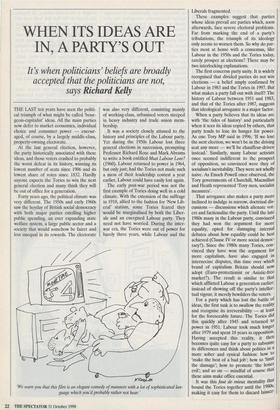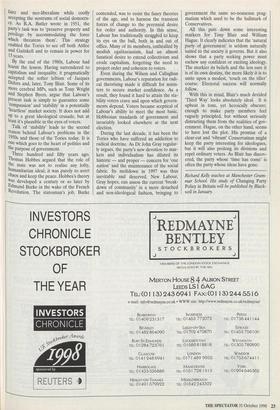WHEN ITS IDEAS ARE IN, A PARTY'S OUT
It's when politicians' beliefs are broadly
THE LAST ten years have seen the politi- cal triumph of what might be called 'bour- geois-capitalist' ideas. All the main parties now defer to market economics, individual choice and consumer power — encour- aged, of course, by a largely middle-class, property-owning electorate.
At the last general election, however, the party historically associated with these ideas, and those voters crashed to probably the worst defeat in its history, winning its lowest number of seats since 1906 and its lowest share of votes since 1832. Hardly anyone expects the Tories to win the next general election and many think they will be out of office for a generation.
Forty years ago, the political climate was very different. The 1950s and early 1960s saw the heyday of British social democracy with both major parties extolling higher public spending, an ever expanding state welfare system, a large public sector and a society that would somehow be fairer and less unequal in its rewards. The electorate was also very different, consisting mainly of working-class, urbanised voters steeped in heavy industry and trade union mem- bership.
It was a society closely attuned to the history and principles of the Labour party. Yet during the 1950s Labour lost three general elections in succession, prompting Professor Richard Rose and Mark Abrams to write a book entitled Must Labour Lose? (1960). Labour returned to power in 1964, but only just; had the Tories not made such a mess of their leadership contest a year earlier, Labour could have easily lost again.
The early post-war period was not the first example of Tories doing well in a cold climate. With the extension of the suffrage in 1918, allied to the fashion for 'New Lib- eral' statism, some Tories feared they would be marginalised by both the Liber- als and an energised Labour party. They need not have worried. During the inter- war era, the Tories were out of power for barely three years, while Labour and the `We warn you that this film is an elegant comedy of manners with a lot of sophisticated lan- guage which you'd probably rather not hear.' Liberals fragmented.
These examples suggest that parties whose ideas prevail are parties which, soon afterwards, face severe electoral problems. Far from marking the end of a party's tribulations, the triumph of its ideology only seems to worsen them. So why do par- ties most at home with a consensus, like Labour in the 1950s and the Tories today, rarely prosper at elections? There may be two interlocking explanations.
The first concerns party unity. It is widely recognised that divided parties do not win elections — a belief amply confirmed by Labour in 1983 and the Tories in 1997. But what makes a party fall out with itself? The history of Labour between 1951 and 1983, and that of the Tories after 1987, suggests that ideological arrogance is a major factor.
When a party believes that its ideas are with 'the tides of history' and particularly when it sees its ideas copied by others, that party tends to lose its hunger for power. As one Tory MP said in 1996, 'If we lose the next election, we won't be in the driving seat any more — we'll be chauffeur-driven instead.' Similarly, many Labour activists once seemed indifferent to the prospect of opposition, so convinced were they of socialism's inevitability. They were not wholly naive. As Enoch Powell once observed, the Tory governments of Churchill, Macmillan and Heath represented 'Tory men, socialist measures'.
That arrogance also makes a party more inclined to indulge in narrow, doctrinal dis- cussions — discussions which alienate vot- ers and factionalise the party. Until the late 1980s many in the Labour party, convinced they had won the argument for more equality, opted for damaging internal debates about how equality could be best achieved (Clause IV or more social democ- racy?). Since the 1980s many Tories, con- vinced they have won the argument for more capitalism, have also engaged in internecine disputes, this time over which brand of capitalism Britain should now adopt (Euro-protectionist or Asiatic-free market?). The result is similar to that which afflicted Labour a generation earlier: instead of showing off the party's intellec- tual vigour, it merely bewilders the voters. For a party which has lost the battle of ideas, the first task is to swallow the reality and recognise its irreversibility — at least for the foreseeable future. The Tories did this quickly after 1945 and returned to power in 1951. Labour took much longer after 1979 and spent 18 years in opposition. Having accepted this reality, it then becomes quite easy for a party to subsume its differences and think about politics in a more sober and cynical fashion: how to `make the best of a bad job'; how to `lim►t the damage'; how to promote 'the lesser evil'; and so on — mindful of course that these aims make office essential.
It was this faut de mieux mentality that bound the Tories together until the 1980s, making it easy for them to discard laissez- faire and neo-liberalism while coolly accepting the nostrums of social democra- cY. As R.A. Butler wrote in 1951, the Party's task was to 'preserve property and privilege by accommodating the force which threatens them'. This strategy enabled the Tories to see off both Attlee and Gaitskell and to remain in power for 13 years.
By the end of the 1980s, Labour had learnt the lesson. Having surrendered to capitalism and inequality, it pragmatically accepted the softer leftism of Jacques Delors and, later, Tony Blair. Some of its more cerebral MPs, such as Tony Wright and Stephen Byers, argue that Labour's present task is simply to guarantee some compassion' and 'stability' in a potentially `heartless' market society. It does not add up to a great ideological crusade, but at least it's plausible in the eyes of voters. Talk of 'stability' leads to the second reason behind Labour's problems in the 1950s and those of the Tories today. It is one which goes to the heart of politics and the purpose of government. Three hundred and fifty years ago, Thomas Hobbes argued that the role of the state was not to realise any lofty, humanitarian ideal; it was purely to avert chaos and keep the peace. Hobbes's theory was developed a century or so later by Edmund Burke in the wake of the French Revolution. The statesman's job, Burke contended, was to resist the fancy theories of the age, and to harness the transient forces of change to the perennial desire for order and authority. In this sense, Labour has traditionally struggled to keep its eye on the ball, both in and out of office. Many of its members, enthralled by modish egalitarianism, had an almost fanatical desire to extend collectivism and erode capitalism, forgetting the need to project order and cohesion to voters.
Even during the Wilson and Callaghan governments, Labour's reputation for radi- cal theorising made it difficult for minis- ters to secure market confidence. As a result, they found it hard to attain the sta- bility voters crave and upon which govern- ments depend. Voters became sceptical of Labour's ability to meet the most basic, Hobbesian standards of government and invariably looked elsewhere at the next election.
During the last decade, it has been the Tories who have suffered an addiction to radical doctrine. As Dr John Gray regular- ly argues, the party's new devotion to mar- kets and individualism has diluted its historic — and proper — concern for 'one nation' and the maintenance of the social fabric. Its meltdown in 1997 was thus inevitable and deserved. New Labour, Gray hopes, can assess the current 'break- down of community' in a more detached and non-ideological fashion, bringing to government the same no-nonsense prag- matism which used to be the hallmark of Conservatives.
All this puts down some interesting markers for Tony Blair and William Hague. It clearly indicates that the 'natural party of government' is seldom naturally suited to the society it governs. But it also shows that a party seeking power must eschew any confident or exciting ideology. The murkier its beliefs and the less sure it is of its own destiny, the more likely it is to unite upon a modest, 'touch on the tiller' course. Electoral success will normally follow.
With this in mind, Blair's much derided `Third Way' looks absolutely ideal. It is upbeat in tone, yet heroically obscure; enough to make party members feel vaguely principled, but without seriously distracting them from the realities of gov- ernment. Hague, on the other hand, seems to have lost the plot. His promise of a clear-cut and 'vibrant' Conservatism might keep the party interesting for ideologues, but it will also prolong its divisions and repel ordinary voters. As Blair has discov- ered, the party whose 'time has come' is often the party whose ideas have gone.
Richard Kelly teaches at Manchester Gram- mar School. His study of Changing Party Policy in Britain will be published by Black- well in January.



















































































 Previous page
Previous page